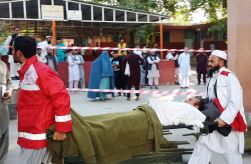 27 October 2015, Kabul, Afghanistan – Following the major 7.5 magnitude earthquake that struck northern Afghanistan and Pakistan on 26 October, WHO is working closely with national health authorities in both countries to support emergency health services and rapidly assess the full extent of the health impact on affected populations.
27 October 2015, Kabul, Afghanistan – Following the major 7.5 magnitude earthquake that struck northern Afghanistan and Pakistan on 26 October, WHO is working closely with national health authorities in both countries to support emergency health services and rapidly assess the full extent of the health impact on affected populations.
To support health facilities receiving high numbers of injured patients in the most affected areas in Afghanistan, WHO has provided trauma kits for the management of 600 trauma/injury cases in the provinces of Jawzjan, Kunduz, Baghla, Ghazni, and Jalalabad.
WHO has also provided basic health kits sufficient for 3000 beneficiaries for one month in Takhar and Faizabad provinces. Additional trauma kits providing materials for 1200 patients requiring trauma care will be dispatched to affected areas in the coming days.
“WHO’s ongoing work with national health authorities to strengthen the country’s emergency preparedness and response plan is now being put into action,” said WHO Representative in Afghanistan Dr Richard Peeperkorn. “These preparedness activities have been critical to ensuring a more effective response.”
“We activated the mass casualty management plan by providing health care services, including trauma management through effective coordination with partners on the ground. We are able to manage excessive caseloads at our level with medical supplies from WHO,” said Dr Shinwari, Director of Jalalabad Provincial Hospital.
Health workers previously trained in simulation exercises are locally managing high caseloads of injured patients. Medicines, trauma kits and medical supplies kits were earlier prepositioned in all WHO offices and hospitals in high-risk areas.
In Pakistan, WHO is working closely with federal authorities for health emergency preparedness and response, and is planning a rapid health assessment with partners to identify the impact of the earthquake and priority health needs in the affected areas of Khyber Pakhtunkhwa province.
“Special emphasis will be given to winterization plans identifying specific health needs as a result of colder temperatures, said WHO Representative in Pakistan Dr Michel Thieren. “Trauma medicines are available in the WHO warehouse in Islamabad and will be delivered as needed to health facilities reporting shortages.”
On a regional level, WHO has pre-positioned additional health supplies in its logistics and operations warehouse in Dubai. These include medicines for disease risks usually following an earthquake, including waterborne diseases, such as diarrhoea and dysentery; acute respiratory infections; vaccine-preventable diseases, such as measles; post-traumatic stress disorders; malaria, dengue fever, leishmaniasis; and complications resulting from discontinued use of medicines for chronic diseases, such as hypertension, diabetes and tuberculosis.
WHO has also activated its Strategic Health Operations Centre in its Regional Office in Cairo, Egypt, to closely monitor the situation and ensure a coordinated response. Due to the remote location of the areas affected, information is being received gradually, and the numbers of people affected will continue to increase as the situation develops.
Related link
Afghanistan: 7.7 magnitude earthquake in Hindu Kush Region
Media contact
Rana Sidani
Senior Communication Officer
Media and Communication programme
WHO Regional Office for the Eastern Mediterranean
direct: +20 2 22765552
mobile: +20 1099756506
e-mail:
This e-mail address is being protected from spambots. You need JavaScript enabled to view it



